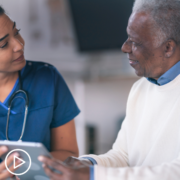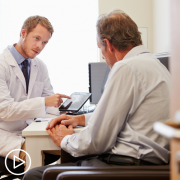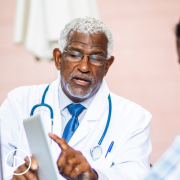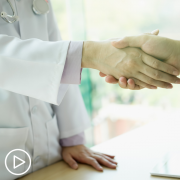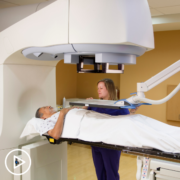How Can Advanced Prostate Cancer Care Barriers Be Overcome?
How Can Advanced Prostate Cancer Care Barriers Be Overcome? from Patient Empowerment Network on Vimeo.
How can barriers to advanced prostate cancer care be overcome? Expert Dr. Isaac Powell from Karmanos Cancer Institute discusses medical mistrust in the African American community and advice he gives to patients about prostate cancer screening and prevention.
See More from [ACT]IVATED Prostate Cancer
Related Resources:

Advanced Prostate Cancer Outcomes: Addressing Disparities and Exploring Solutions |

|

Are There Worldwide Links to Aggressive Prostate Cancer? |
Transcript:
Lisa Hatfield:
Are there any challenges unique to minority communities that hinder access to advanced prostate cancer treatments and therapies? And do you have thoughts on how these barriers can be effectively addressed?
Dr. Isaac Powell:
I do. First of all, the diagnosis has to be made. And so that’s made by screening, by the PSA testing and digital rectal exams. Now, some people are talking about, well, we don’t need to do the digital rectal exam. That absolutely is not true. You can have a very aggressive cancer and have a normal PSA. We know that the PSA is not 100 percent accurate in diagnosing, predicting that you may have prostate cancer sometimes.
And I’ve had several patients who had normal PSAs, abnormal rectal exams, and as a result, I’m biased with them. If you don’t do the rectal exam and you have a normal PSA, you may miss aggressive cancers. So definitely have your usual rectal exam, excuse me. And once after that, if you have a biopsy, and if it is positive, then again I think that aggressive therapy is the way to go, if you’re in good shape.
Now, people are afraid of cancer. I mean, afraid of surgery. I’ve had surgery, so I can talk to them about what I’ve had and what you go through. Men are also concerned about losing their sexual function and those kinds of things related to the treatment of prostate cancer. And I can tell them that the quality of life is okay after that because we have ways of treating sexual dysfunction, the pill that everybody knows about, as well as injection and penis and ultimately the penile prosthesis. So that can be fixed.
And the other issue of losing control of the urine, that can be fixed as well. And so those are the things I tell people about not specifically among African Americans. There’s the genetic and the biology that I have to discuss, but one of the things that drives these genetic cells is obesity.
Obesity can produce these pro-inflammatory cytokines. So I always advise them to, if they are obese, to reduce their weight and their fat, particularly belly fat. That’s challenging because people have difficulty losing weight. The other thing is exercise. Exercise is a key that I think it is the most important factor in treating many health conditions, exercise. And what exercise does, and this has been studied in breast cancer, it decreases the expression of the genes that I described earlier. In terms of prior driving the cancer and breast cancer, they’ve found it decreases the pro-inflammatory cytokines. I described the tumor necrosis factors IL-6 and IL-8. So that’s important, exercise. So those are the things that I tell patients. And now in terms of advanced disease there are clinical trials that are there.
And we do these trials to decide what’s the best treatment for cancer, even though we don’t have “a cure.” Now, the problem among African Americans is that they don’t trust these clinical trials because of the abuse that African Americans have suffered through slavery and all the other kinds of things when they’ve been treated as less than human, like animals being operated on without having any anesthesia and many other abuses that have occurred. And so there’s this major distrust now that’s very difficult to eliminate in the Black community, especially if there are very few African American doctors to take care of them. So what I think that we have to fix that question of distrust, and that’s going to take a while, but I talk to them always about this mistrust issue, because I can’t see everybody, although we do need more African American doctors and nurses to take care of them and to encourage them to participate in clinical trials and to be seen as a person who is going to be taking care of them in clinical trials, that’s very important.
Often we talk about access to care, but particularly African Americans that mostly live in large cities where there is access to care. But, in terms of one particular example that’s brought up on occasion is what has occurred in Baltimore and other big cities where I talk to an African American, you know Johns Hopkins is right in the middle of the African American community. So it’s not about access again, it’s about mistrust. And I said, “Well, why don’t African Americans go to Johns Hopkins?” Well, she says, “If you walk past Johns Hopkins, they may steal your bodies.” I said, what? I didn’t believe that, but I’ve been reading literature, particularly one called the Medical Apartheid where they talked about African slavery, where they dug up the bodies of slaves to practice the anatomy.
And so that’s where this idea occurred. At night, they would dig up the bodies and do this, and not only in Baltimore, but other cities as well. So again, the mistrust issue is very difficult to resolve because of those issues. And people talk about that, well, I just don’t trust the white healthcare system, period. And don’t want to go until they’re having symptoms, and then they have no choice. They have to go. And by this time, the cancers are more advanced and cannot even prolong life expectancy in those particular patients. So I’m not sure I answered your question in terms of what a person or what I would do to activate participation in the healthcare of advanced disease.



